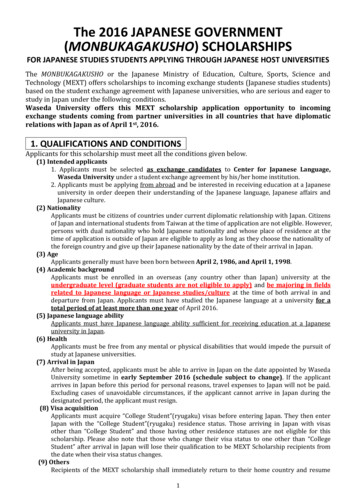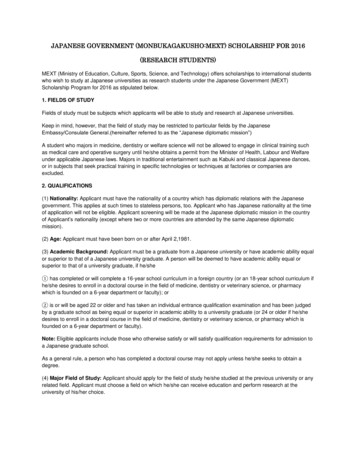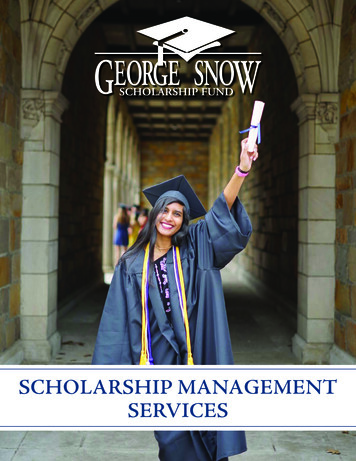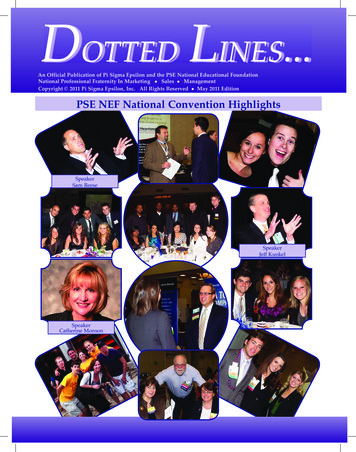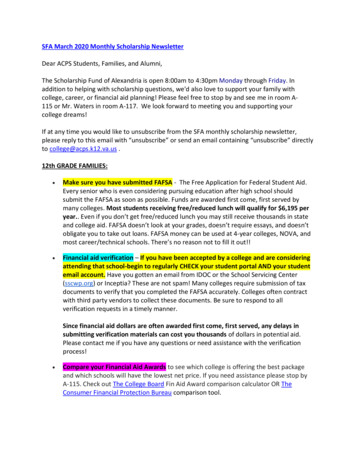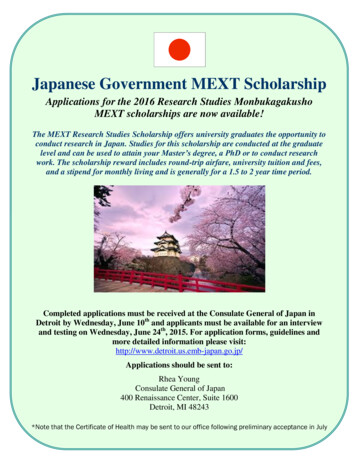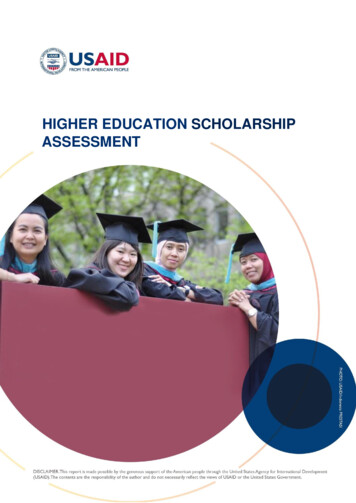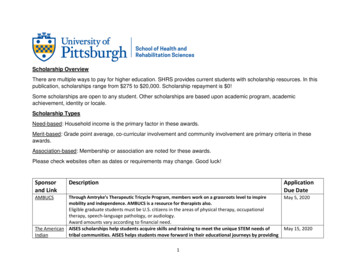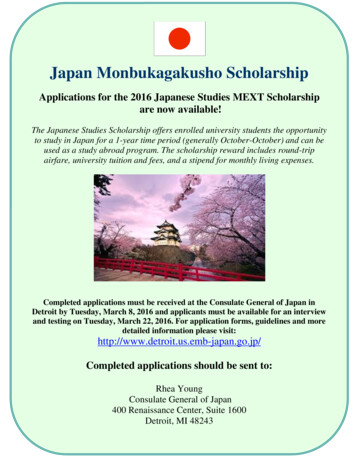
Transcription
Japan Monbukagakusho ScholarshipApplications for the 2016 Japanese Studies MEXT Scholarshipare now available!The Japanese Studies Scholarship offers enrolled university students the opportunityto study in Japan for a 1-year time period (generally October-October) and can beused as a study abroad program. The scholarship reward includes round-tripairfare, university tuition and fees, and a stipend for monthly living expenses.Completed applications must be received at the Consulate General of Japan inDetroit by Tuesday, March 8, 2016 and applicants must be available for an interviewand testing on Tuesday, March 22, 2016. For application forms, guidelines and moredetailed information please ted applications should be sent to:Rhea YoungConsulate General of Japan400 Renaissance Center, Suite 1600Detroit, MI 48243
JAPANESE GOVERNMENT (MONBUKAGAKUSHO: MEXT) SCHOLARSHIP FOR 2016(J APANES E S TUD IES S T UDE NT S )The Ministry of Education, Culture, Sports, Science and Technology (MEXT) offers scholarships to foreign students to study for a period ofone year at designated Japanese universities in order to deepen their understanding of the Japanese language, Japanese affairs and Japaneseculture.Regulations for the 2016 MEXT Scholarship Program are as follows:1.QUALIFICATIONSThe Ministry of Education, Culture, Sports, Science and Technology (MEXT) is now accepting applications from overseas students forstudy in Japan. Our aim is to foster human resources who will become bridges of friendship between your country and Japan through study inJapan and who will contribute to the development of both countries and the wider world.(1) Nationality:Applicants must have the nationality of a country that has diplomatic relations with Japan.Anapplicant who has Japanese nationality at the time of application is not eligible. However, persons withdual nationality who hold Japanese nationality and whose place of residence at the time of application isoutside of Japan are eligible to apply as long as they give up their Japanese nationality and choose thenationality of the foreign country by the date of their arrival in Japan. Applicant screening will beconducted at the Japanese diplomatic mission in the country of applicant’s nationality.(2) Age:Applicants generally must have been born between April 2, 1986, and April 1, 1998.(3) Academic Background:Applicants must satisfy the following two conditions.1. Applicants must be undergraduates at foreign (non-Japanese) universities majoring in fields related tothe Japanese language or Japanese culture at the time of arriving in and leaving Japan.2. Those who have studied the Japanese language at a university for a total period of at least more thanone year as of April 2016. Those who have studied Japanese for a total of at least one year at anotheruniversity should submit without fail documents (transcript of grades at other university, etc.) that canverify that the applicant studied Japanese for a period of at least one year at the said university;Those majoring in fields of study other than Japanese language and Japanese culture (such asengineering, economics, agricultural science, architecture, and art) and who wish to pursuecomplementary studies in Japanese language and culture should apply for other scholarships, such asthe Japan Student Services Organization (JASSO) Student Exchange Support Program (Scholarshipfor Short-term Study in Japan).(4) Japanese Language Ability: Applicants must have Japanese language ability sufficient for receiving education at a Japaneseuniversity in Japan.(5) Health:Applicants must be free from any mental or physical disabilities that would impede the pursuit of studyat Japanese universities.(6) Arrival in Japan:Applicants must be able to arrive in Japan within the two weeks before the first day of the course set bythe university in Japan (usually October) and the period set by the admitting university. (If the applicantarrives in Japan before this period for personal reasons, travel expenses to Japan will not be paid.Excluding cases of unavoidable circumstances, If the applicant cannot arrive in Japan during thedesignated period, the applicant must resign.)(7) Visa acquisition:Applicants must acquire College Student (ryugaku) visas before entering Japan. They then enter Japanwith the College Student (ryugaku) residence status. Please also note that those who change their visastatus to one other than College Student after arrival in Japan will lose their qualification to be JapaneseGovernment Scholarship recipients from the date when their visa status changes.1
(8) Applicants must return to their home country and school and resume their studies immediately after the end of the scholarship period.In addition, while the applicant is studying in Japan, he/she shall contribute to mutual understanding between Japan and the homecountry by participating in activities at schools and communities with the aim of contributing to the internationalization of Japan. Theapplicant shall make efforts to promote relations between the home country and Japan by maintaining close relations with theuniversity attended after graduation, cooperating with the conducting of surveys and questionnaires after the return home, andcooperating with all relevant projects and events conducted by Japanese diplomatic missions in the applicant’s home country.(9)Any applicant who meets any or all of the following conditions is ineligible. If identified after the start of the scholarship period, theapplicant will be required to withdraw from the scholarship.1. Those who are military personnel or military civilian employees at the time of their arrival in Japan;2. Those who have received a Japanese Government Scholarship (Monbukagakusho scholarship) in the past;3. Those who are currently enrolled at a Japanese university with a College Student (ryugaku) residence status; those enrolled, orscheduled to be enrolled, at a Japanese university as a privately financed international student during the period when thescholarship application was filed in the home country until prior to the start of the provision of the scholarship; However, evenif the applicant is currently a privately financed international student studying in Japan, this restriction does not apply to anapplicant who will certainly finish the current course before the start of the designated course at the Japanese university andwill return to the home country;4. Recipients of scholarships from institutions other than MEXT (including government institutions in their home countries) thatoverlap with the Japanese Government Scholarship (Prospective beneficiaries are included);5. Recipients who make a double application for this scholarship to other universities, other embassy recommendations, and theStudent Exchange Support Program provided by Japan Student Services Organization(JASSO);6. Holders of dual nationality at the time of application who cannot verify that they give up Japanese nationality by the time of thearrival in Japan.2.TERM OF SCHOLARSHIPThe term is the period necessary to complete the admitting university’s study course, which should be approximately one year from October2016 (the starting month of the course). Extension of the term is prohibited.3.SCHOLARSHIP BENEFITS(1) Allowance:117,000 yen per month. (In case that the recipient researches in a designated region, 2,000 or 3,000 yen per month willbe added. The monetary amount each year may be subject to change due to budgetary reasons.) The scholarship iscancelled in principle if the recipient is absent from the university for an extended period. The scholarship will be alsocancelled in principle in the following situations. If the recipient has been receiving the scholarship despite his/herfalling under any of the following situations, the recipient will be ordered to return the amount of scholarship that he/shereceived during the period wherein he/she was involved with any of the following situations.1. The recipient is determined to have made a false statement on his/her application;2. The recipient violates any article of his/her pledge to the Minister of Education, Culture, Sports, Science andTechnology;3. The recipient violates any Japanese laws and is sentenced to imprisonment with or without work for life or fora period of exceeding 1 year. However, this shall not apply to those who were found guilty with suspension ofexecution of sentences;4. The recipient is subjected to disciplinary action by the university, including expulsion;5. It has been determined that it will be impossible for the recipient to complete the training course within thestandard time period because of poor academic grades or suspension from the university;6. The recipient’s residence status has changed to one other than College Student as defined in the AppendedTable I-4 of the Immigration Act;7. The recipient has received a scholarship from another institution (excluding those specified for researchexpenditures).(2) Transportation1. Transportation to Japan:The recipient will be provided, according to his/her itinerary and route as designated by MEXT, with aneconomy-class airplane ticket from the international airport in principle, in the country of nationalitynearest to his/her home country residence* to the New Tokyo International Airport or any otherinternational airport that the appointed university usually uses. Expenses such as inland transportationfrom his/her home address to the international airport, airport tax, airport usage fees, special taxes ontravel, or inland transportation within Japan will NOT be covered. (*The address in the home countrystated in the application form is in principle regarded as the recipient’s “home country residence.”)2
2. Transportation from Japan:The recipient who returns to his/her home country within the fixed period after the expiration ofhis/her scholarship will be provided, upon application, with an economy-class airplane ticket fortravel from the New Tokyo International Airport or any other international airport that the appointeduniversity usually uses to the international airport nearest to his/her home address (in principle, inthe country of nationality).(Note 1) Any aviation and accident insurance to and from Japan shall be paid for by the recipient.(Note 2) Should the recipient not return to his/her home country soon after the end of the scholarship period to resume his/herstudies, the transportation fee for the return to the home country will not be provided.(3) Tuition and Other Fees: Fees for the entrance examination, matriculation, and tuition at universities will be paid by the Japanesegovernment.4.DOCUMENTS TO BE SUBMITTEDApplicants must submit the following documents to the Japanese diplomatic missions by the required date. The submitted documents willnot be returned. These documents must be written in Japanese or English, or translations in either of these languages should be attached. Noapplication will be considered unless the aforementioned application documents and all other necessary attachments are fully and correctlycompleted. Number the documents(① through ⑧) in the right upper corner.①Application Form (prescribed form for FY2016) 【original 1】※photo attached②Placement Preference Application Form (prescribed form for FY2016) 【original 1】※photo attached※Select the preferred university from among the universities listed in the “Course Guide of Japanese Studies Program” available at theJapanese diplomatic missions in the home country and fill in three university names at most and two-digit course codes in the PlacementPreference Application Form in order of preference.※Attach one photo each to the Application Form and the Placement Preference Application Form. The photos must have been taken withinthe past six months and be 4.5 x 3.5 centimeters in size. They must show the applicant full-face from the chest up and with no hat. Writename and nationality on the back of the photos; paper copies not accepted. It is acceptable to attach the photo to the application data andprint out each form. (However, do not print out the photo data yourself and attach the paper copy to the application forms.)③Certified academic transcript from the university the applicant is currently attending※Please mark subjects related to Japanese language and Japanese culture. Those who have studied the Japanese language and culture for atotal of less than one year are not eligible to apply. 【original 1】④Documents verifying that the applicant has studied the Japanese language for at least one year. 【original 1】(Only for those who cannot verify with the document③ that they studied Japanese for a total of at least one year at a university.)⑤Certificate of university enrollment【original 1】⑥Recommendation from the head of or academic advisor at the university currently attending【original 1】⑦Medical certificate (prescribed form for FY 2016) 【original 1】⑧If the applicant has qualifications concerning Japanese-language ability, documented proof of such qualifications【copy 1】5.SELECTION(1) The Japanese diplomatic missions will carry out the primary selection of applicants by means of a review of the submitted documents ,a written examination (subject : Japanese) and an interview .(2) Results of the primary selection will be notified on a date separately designated by each Japanese diplomatic missions.(3) Applicants who pass the primary selection will be recommended by the Japanese diplomatic missions to MEXT.(4) MEXT will conduct the secondary (final) selection of the applicants recommended by the Japanese diplomatic missions anddetermine the scholarship recipients.(5) Results of the secondary selection will be notified on a date separately designated by each Japanese diplomatic mission.6 . ADMISSION, PLACEMENT, AND SPECIALIZED STUDY IN JAPANESE LANGUAGE AND JAPANESE CULTURE ATUNIVERSITIES(1) The study/training is implemented only in the university/study courses listed in a booklet “Course Guide of Japanese StudiesProgram.”(2) MEXT, in consultation with the universities concerned, will decide on the university in which each recipient shall be enrolled takinginto consideration his/her Japanese language ability and specialized courses he/she wishes to take. Objections regarding universityplacement will not be accepted.3
(3) The study at universities will be conducted in Japanese.(4) University placement and specialized study of Japanese language and Japanese culture will be conducted as follows.Specialized Japanese language and Japanese culture study will be divided into the following two courses, depending on the objectiveof the study: (a) A course conducted mainly to improve students’ Japanese language proficiency with supplementary study aboutJapan and Japanese culture, and (b) A course conducted mainly about Japan and Japanese culture with supplementary study toimprove Japanese language proficiency.The specific course contents vary with each university, but every student will take special lectures on Japan, Japanese culture, andJapanese language and specialized practical study, as well as classes in the departments related to his/her individual major.(5) A recipient who has completed a specified course at the university concerned will be given a certificate.However, the purpose of this scholarship program is not to obtain a diploma. Therefore, a recipient cannot be enrolled in anundergraduate course at a university or a master’s or a doctorate course at a graduate school as a Japanese-government-sponsoredinternational student during this program or right after its completion. (This same restriction applies to privately financed overseasstudents enrolled in an undergraduate course at a university or a master’s degree or doctoral course at a graduate school. If therecipient should be enrolled in such a course, the recipient will be required to pay back the entire amount of the scholarship moneyretroactive to the start of the scholarship payment.)7.NOTES(1) The recipient is advised to learn, before departing for Japan, the Japanese language and to acquire some information about Japaneseweather, climate, customs, university education, and conditions in Japan, as well as about the difference between the Japanese legalsystem and that of his/her home country.(2) As the first installment of the scholarship payment cannot be provided immediately upon the recipient’s arrival, the recipient shouldbring approximately US 2,000 or the equivalent thereof to cover immediate needs after arrival in Japan.(3) Accommodations:1. Residence halls for international students provided by universities.Some universities have residence halls for international students. The recipients enrolled at such universities may reside at theseresidence halls under certain conditions. However, due to the limited number of rooms, some of these facilities may beunavailable.2. Private boarding houses or apartments:Those who are unable to find accommodation in the aforementioned facilities may live in regular dormitories of the university orin private boarding houses/apartments.It is difficult for recipients with dependents to find appropriate housing in Japan. The recipient is requested to arrive in Japan alonefirst to secure housing before having his/her spouse and/or family come to Japan.(4) It is the recipients’ responsibility to verify whether the completion of the courses in Japan will be recognized as credits in his/her homecountry. If they need further information regarding the content of the course, please directly contact the university that offers thecourse.(5) In addition to the regulations stipulated in this guideline, those that are necessary to implement the MEXT Scholarship are determinedby the Japanese government.(6) More detailed information on this scholarship program is available at the Japanese diplomatic missions.(7) Information regarding the recipient (name, gender, birthdate, nationality, accepting university, graduate school/undergraduate school,specialty, period of enrollment, career path after completion of course, contact information [address, telephone number, e-mailaddress]) may be shared with relevant government organizations for the purpose of the use of the information in overseas studentexchange programs (support during period of study, follow-up, improvement of the overseas student system) implemented by theJapanese Government.Information regarding the recipient other than date of birth and contact information may be opened to the public after study in Japanin order to introduce the activities of returning recipients around the world in materials produced by the Japanese Government aspublicity for promoting the acceptance of overseas students in Japan.These matters are included in the Pledge stipulating rules and regulations which MEXT Scholarship recipients must comply with andsubmit when they have been granted the Scholarship. Excluding exceptional circumstances, only those concurring with theseconditions will be accepted as MEXT Scholarship recipients and will be granted the Scholarship.4
A P P L I C AT I O N F O R J A PA N E S E G O V E R N M E N T ( M O N B U K A G A K U S H O : M E X T ) S C H O L A R S H I ��申請書Japanese Studies Students for FY2016( 2 0 1 6 年 度 日 本 語 ・ 日 本 文 化 研 修 留 学 生 )INSTRUCTIONS(記入上の注意)1.Type application, if possible, or write neatly by hand in block e Arabic �。)3.Write years in the Anno Domini system. ��Write proper nouns in full without abbreviation. �一切省略しないこと。)※ Personal data entered in this application will only be used for scholarship selection purposes, and contact information such as email addresses willonly be used to create academic networks after the student returns home and by the Japanese government to send out information when に使用するほかは、特
Japan Monbukagakusho Scholarship Applications for the 2016 Japanese Studies MEXT Scholarship are now available! The Japanese Studies Scholarship offers enrolled university students the opportunity to study in Japan for a

